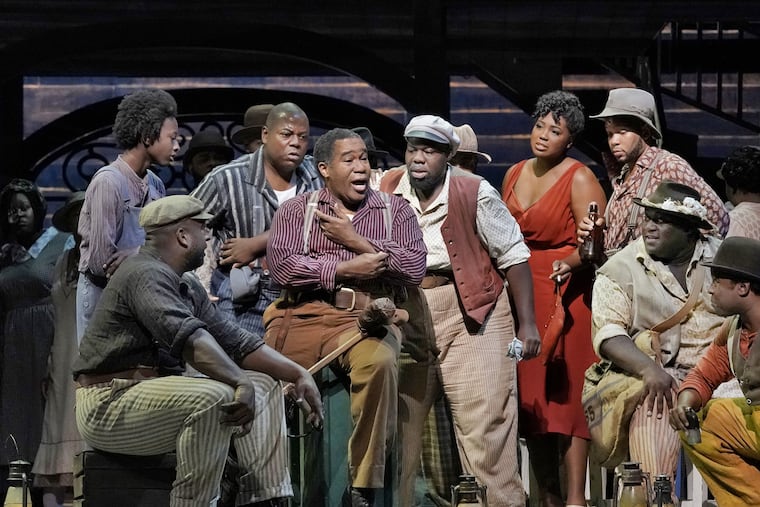Philadelphia’s own Eric Owens opens Metropolitan Opera season in a new production of ‘Porgy and Bess’
The star bass baritone from Mt. Airy, now at the peak of his career, touches core emotion as Porgy, standing out in an uneven revival.

NEW YORK — The Gershwin opera Porgy and Bess returned to the Metropolitan Opera on Monday for the first time in nearly 30 years with its typical sense of occasion, but also as a litmus test for how race relations are regarded in the opera community — and well beyond that.
The stereotyped Southern patois of its characters has long rankled many — the late Nobel Prize winner Toni Morrison being among the most vocal. Yet all over Manhattan, advertising images of costars Eric Owens and Angel Blue send out a message of inclusiveness, yielding an opening night audience that wasn’t nearly as white as usual. The Met chooses just a few key images to promote and define its season, and this is one of them.
From the Eric Owens standpoint, few bass baritones of any sort get this kind of star treatment, and it comes as Owens is coming home to Philadelphia this year to take over the Curtis Institute’s Vocal Studies Department — he grew up in Mount Airy, and studied at both Curtis and the Settlement Music School — and is also starring in the Lyric Opera of Chicago’s 2020 Ring Cycle.
It’s career peak time for the 49-year-old bass baritone, who can sing Porgy and Bess with no fears of typecasting because of his great variety of options in operatic roles. Even as colorblind casting has come slowly to operatic basses, Owens has steadily moved through the repertoire, from contemporary operas such as L’Amour de Loin to classic roles such as King Philip in Don Carlo.
The new Porgy and Bess production plays through Oct. 16, then picks up again in January, when Owens rejoins the production starting Jan. 15, and concludes Feb. 1 with one of the Met’s Live HD international simulcasts. The opening-night reception suggests he has a triumph on his hands — even if so much around him isn’t quite right, both in the new production and the way time has been a mixed blessing for this 1935 piece.
The authors for this story about the Gullah community in South Carolina — where the crippled beggar Porgy falls in love with the morally questionable Bess — were all white: George and Ira Gershwin, plus DuBose Heyward (who wrote the original play Porgy). Stereotypes from 80 years ago persist.
And yet Porgy and Bess can also be seen as a window onto an overlooked culture. Porgy was a real person. If you’ve been to old Charleston, you’ve walked where Porgy panhandled. Kittiwah Island — where a key scene takes place — very much exists (though spelled Kiawah).
Several years before his 1998 death, Todd Duncan, the original (and initially skeptical) Porgy, sat with me as he flipped through the opera’s score, pointing to certain vocal lines and saying, “That’s Gullah.”
Gershwin came by that honestly: He lived in the Gullah culture for a summer and, back home, tirelessly raised money for his opera with a regular radio show. Rehearsal recordings for Porgy and Bess show a composer who was very precise about what he wanted. If only modern interpreters had such an accurate inner compass.
The many moving parts of Porgy and Bess have never had standard procedures. From the Act III hurricane to Porgy’s disability (here, he walks on crutches, aided by a cart), challenges are at every turn. The main virtue of James Robinson’s direction here — and of Michael Yeargan’s skeletal, revolving Catfish Row set — is the deep sense of community.
Unconventional choices
Elsewhere, unconventional choices abound.
Kittiwah Island looks like a state park, rather than place where criminals easily hide out. The raping, murdering Crown (Alfred Walker) isn’t typically alpha, but just one of the guys with extra arrogance. When the drug dealer Sportin’ Life (Frederick Ballentine) finally lures Bess away with “There’s a Boat That’s Leaving Soon For New York,” the song wasn’t the usual showstopper, but more like low-key hypnosis, reminding you this is about cocaine addiction.
The Catfish Row street vendors, in contrast, turned their cameo appearances into too-fully blown star turns — but with some attractive vocal improvisation. Though Angel Blue’s Bess was full of theatrical charisma, she sang merciless fortissimos during her duet with Owens, “Bess You Is My Woman Now,” undercutting the natural beauty of her voice and blotting out his.
At the risk of sounding biased in favor of the Philly guy, Owens and conductor David Robertson (using a trimmed score) were the two solid elements, both finding a convincing tone in every scene.
Owens skillfully navigated his zigzag emotional progression when romance brings humiliation. Thanks partly to his vocal precision, he conveyed great intimacy in the midst of this grand opera — and in one the largest opera houses in the world. Only Denyce Graves as Maria had that similar knack.
Other cast members coped with the opera’s grandeur by just pushing their voices, sometimes too hard. Owens does not, and touches a certain core emotion that’s distinctive to this opera: Like Porgy, we’re all crippled, maybe not obviously but in one way or another. Owens somehow locates that corner of your psyche, reminding you it’s there, but treading on it gently.
OPERA REVIEW
Porgy and Bess
Through Oct. 16 then resuming Jan. 8-Feb. 1 at the Metropolitan Opera, 30 Lincoln Center Plaza, New York. (Eric Owens resumes his Porgy role Jan. 15.)
Tickets: $53-$275
Information: metopera.org or 212-362-6000.